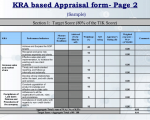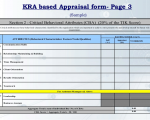
Objective Vs. Subjective Performance Appraisals
Organizations must choose the degree to which performance appraisals are to be objective (evaluating performance against specific standards) versus subjective (evaluating how “well” ...

Performance Appraisal Interview
Performance appraisal is a face-to-face conversation between the rater and the ratee to discuss issues of performance appraisal and to understand each other’s position in order to ...

Reasons for Performance Appraisal
There are several reasons why appraisal are carried out in organizations these may be summarized as follows:
1. To identify an individual’s current level of job performance.
2. ...

Performance Management – MCQs
Q.1. Which of the following terms refers to the process of evaluating an employee’s current
and/or past performance relative to his or her performance standards?
a) Recruitment ...

Performance Appraisal – MCQs with answers
1. “The person who was a good performer in distant past is assured to be okay at present also”. This is an example of ________________ bias in Performance Appraisal
(adsbygoogle ...

7 steps to help write employee Goals
1. Identify the appropriate Organization KPIs where the employee can contribute meaningfully. It is important to note that all KPIs are not applicable to each employee.
2. Document ...

Difference between a KRA and a KPI
A key result area (KRA) is an strategic factor either internal to the organization or external, where strong positive results must be realized for the organization to achieve its strategic ...

Steps of Performance Appraisal Process
Step 1: Establish performance standards
Performance standards are set to ensure achievement of departmental goals and objectives and the organization’s overall strategy and objectives. ...

How to overcome the Performance Appraisal Errors
The problems of performance appraisal have to be dealt with judiciously to improve the appraisal system of the organization.
(adsbygoogle = window.adsbygoogle || []).push({});
1. ...
Benefits of MBO
=>> Management by objectives helps employees appreciate their on-the-job roles and responsibilities.
=>> The Key Result Areas (KRAs) planned are specific to each employee, depending ...
